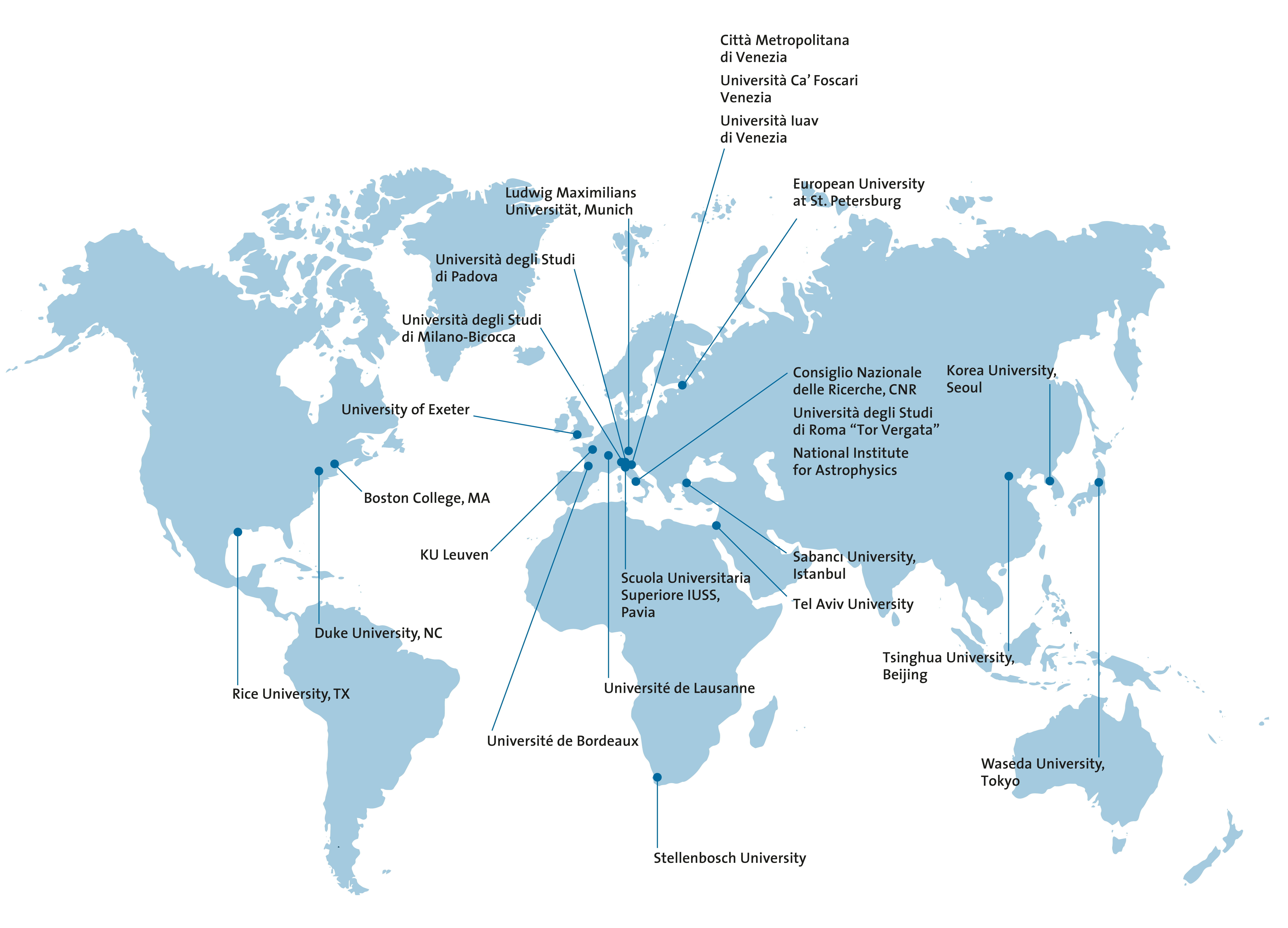Venice International University is a global consortium of universities and research institutions dedicated to advancing international, interdisciplinary, and intercultural learning, teaching, and research cooperation.
Thirty years ago, the founding members imagined that a small island in the heart of the Venetian Lagoon could become a global crossroads for ideas, dialogue, and transformation. With foresight, they envisioned San Servolo as the home of a university consortium where the world's greatest challenges could be explored beyond borders, beyond disciplines, and beyond convention.
What began with five pioneering institutions has grown into a dynamic network of twenty universities and research institutions from across the globe. Today, students, faculty, and researchers from every continent come together at VIU, forming a vibrant international community that lives and learns at the intersection of cultures, perspectives, and fields of knowledge.
VIU is a meeting point of minds. A place where boundaries dissolve, where disciplines converse, and where curiosity drives collaboration. Programs are shaped to cross frontiers, linking the sciences and humanities, technology and society, theory and action.
Everything here is collaborative, interdisciplinary, and open to bold experimentation. Funded and guided by its member institutions, VIU is a collective platform that is agile, inclusive, and constantly evolving.
At its heart lies a clear and urgent mission: to empower new generations with the knowledge, imagination, and responsibility needed to face the environmental, social, cultural, and technological challenges of our time, and those yet to come.
Venice, with its fragile beauty and enduring legacy, is more than a setting: it is a source of insight and inspiration. On this island, the past speaks, the present demands attention, and the future becomes a space for bold imagination.
Where Ideas Meet the World
At VIU, academic programs are designed collectively by its members, focusing on themes that matter globally and resonate locally in Venice and its lagoon.
Study and research are not confined to the classroom. Learning here is active, interdisciplinary, and always connected to the real world.
The Globalization Program is the core of VIU’s academic life. Courses explore urgent questions of sustainability: climate change, biodiversity, environmental management, restoration, policy, ethics, economics, law. They engage with cultural heritage, addressing fragile urban centers and the power of culture to drive development. They examine the intersections of science and society, global change, migration, technology, and urban transformation. The environmental humanities, history and memory studies, and cultural studies offer distinctive perspectives on how societies remember, imagine, and act.
Faculty from member universities bring their expertise, while students from across the world contribute their own cultures and perspectives. The result is a dynamic, challenging, and inspiring classroom, where ideas are tested, assumptions are questioned, and curiosity is rewarded. Students join for a semester, a year, or a summer session, earning credits while gaining something far greater: the ability to think across borders and to grow into leaders ready for an interconnected world.
Next Generation of Researchers
VIU’s Intensive Graduate Activities are designed for the next generation of researchers. They encourage boldness: tackling transversal topics that no single discipline can solve. They foster collaboration across cultures, institutions, and fields.
Three formats carry this vision forward:
- PhD Academies – advanced doctoral training to build transversal skills and foster cooperation.
- Graduate Seminars – launching early PhD students into research with guidance and peer exchange.
- Summer Schools – intensive programs presenting cutting-edge research in a given field.
Each initiative is collaborative by design, involving scholars from at least three member institutions and different disciplines. The outcome is not just academic training, but the creation of lasting global networks and innovative approaches to research.
Research with Reach
Research at VIU builds on this spirit of collaboration. The Thinking Global Resilience Research Networks connect scholars across borders to share ideas, organize workshops and webinars, develop joint projects, and publish together. Their focus areas include:
- Cities and Global Change
- Global Resilience and Just Energy Transition
- Global and Environmental Humanities
- Education for Sustainability
Complementing these are VIU’s Science Communication initiatives. A dedicated unit supports researchers, communications officers, and decision-makers, ensuring that knowledge is shared across disciplines and beyond academia. Training, workshops, and direct contributions to projects make scientific communication part of the research process itself.
Focused research groups and projects further explore ageing societies, republics and republicanism, cultural heritage management, and the future of transport and logistics.
Venice and San Servolo Island
The VIU campus, on San Servolo Island, offers more than classrooms. Its gardens, courtyards, and island setting create a unique residential community, a place in which learning and reflection flow naturally. Venice itself becomes a living laboratory: fragile, complex, and inspiring. Students and faculty engage directly with the city’s challenges of heritage, sustainability, and resilience.
Local partnerships enrich programs with guest lectures, field visits, internships, and public events. In this way, VIU is not only in Venice but of Venice, part of its cultural life, contributing knowledge, creativity, and dialogue.
A Global Community
Twenty-three universities and research institutions form the VIU network today. What unites them is the conviction that the challenges of our time - environmental, social, technological, cultural - cannot be faced in isolation. They must be addressed together, across disciplines, across cultures, across generations.
--
Venice International University was founded on December 15, 1995 and is a legally recognized association operating under Italian private law. Its status as a non-profit association carries full patrimonial autonomy.
The Italian Ministry for University Education and Scientific and Technological Research formally recognizes the Venice International University association as an international centre of higher education and research (by Ministerial Decree on 23 October 1997).























